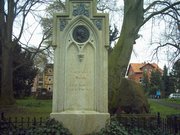Talk:Carl Friedrich Gauss
|
|
| Contents |
Papers in German
I understood that Gauss was the earliest (or the first important) scientist to start writing his papers in his native language (German) rather than Latin, if anyone can confirm whether this is true it would make a useful addition to the page, as eventually this leads to the use of English as the language of science rather than Latin.
No, this isn't the case - most of Gauss' works were written in Latin, such as his 1799 doctoral thesis (proving the fundamental theorem of algebra), and of course, the Disquisitiones Arithmeticae, published in 1801. According to E.T. Bell, Gauss did eventually capitulate to the nationalist mood in post-revolutionary Europe, writing some of his astronomical papers in German, but in any case this was well after Lagrange, who from 1754 was publishing results in both Italian and French (though I don't know whether Lagrange was the first to write maths in vernacular). RMoloney 16:16 Apr1, 2005 (UTC)
Gauss or Gau▀
Is it Gauss or Gau▀? I still don't know, can someone with deep knowledge of German spellings please step in? -- J÷rgen Nixdorf
- "carl gauss" leads "carl gau▀" 5-to-1 on Google, and "Gauss" is used on many German sites, which suggests keeping "Gauss" as the preferred form for English wikipedia. I see "Gau▀" in official names of schools and such, which suggests that the article could use a footnote at least. My old copy of Curme suggests "Gau▀", per the rule to use ▀ after long vowels. Note both spellings appearing on the same page at places like http://www.math.uni-hamburg.de/math/ign/gauss/gaussges.html ... Stan 23:15 Mar 28, 2003 (UTC)
- If we were writing this in German maybe this would matter, but this is in English. Michael Hardy 01:40 20 Jul 2003 (UTC)
- Actually spelling rules in Germany have abandoned the '▀' a few years ago. It is still used by some people(being highly debated), but no longer part of official spelling. I think that applies to names as well. Renke
- According to the new spelling rules in Germany, the ess-tsett still remains in names and in most cases after two vowels. Keep the annotation. -- Anonymous 02:26, 27 Oct 2004 (UTC)
- I just checked his grave stone, and it quite clearly doesn't use a ligature for the final "ss". I think that's actually the more common spelling in German as well, though it looks unusual according to today's orthographical rules. Prumpf 18:30, 10 Apr 2004 (UTC)
German letters are used, in English, when referring to German names. Pizza Puzzle
Wantzel's proof
Mathematicians are notoriously incompetent historians. Gauss NEVER gave a proof of the necessity of the constructibility of the regular n-gon. WANTZEL proved this in 1837. If you read otherwise, it's because mathematicians are sloppy historians. Revolver
- And if this is true the correct thing to do is to edit the article! Paul Beardsell 18:49, 27 Mar 2004 (UTC)
- I did edit the article to make it correct. Look at the page history, several months ago. It originally said that Gauss proved necessity and sufficiency (I'm assuming this is what "completely solved" and "determined all constructible regular polygons" means.) I changed it so that it correctly only attributes sufficiency to Gauss, but does not give him credit for necessity. I didn't feel Wantzel was necessary to mention, because it's an article on Gauss in general, not on constructible numbers, say. Revolver 01:14, 3 Apr 2004 (UTC)
- Sorry. Paul Beardsell 02:22, 3 Apr 2004 (UTC)
Land of death
The article mentions that he died in G÷ttingen, Hanover (now Germany). Shouldn't a link to the land of the death really be Hanover (state), as opposed to linking to the city of Hanover? --Romanm 10:43, 6 Apr 2004 (UTC)
- Yes. I've fixed the link. --Zundark 10:58, 6 Apr 2004 (UTC)
Tombstone
- Gauss was so pleased by this result that he requested that a regular 17-gon be inscribed on his tombstone.
- The stonemason that built his grave stated that its construction would be too complex to effect, and that it would end up looking like a circle. I've edited the page to show this. Liam Bryan 11:40, 2005 Apr 30 (UTC)
Logarithms
Shouldn't there be a mention of Gauss' connection between logarithms and primes? Ilyanep 15:52, 11 Jun 2004 (UTC)
- I agree. Gauss's contributions to prime number theory are important. He even has a kind of primes names after him, gaussian primes that have no complex factors. So for example, 3 is a gaussian prime, but 17 is not because (4 + i)(4 - i) = 4^2 - i^2 = 17. Legendre and him were some of the first people to produce a model for the density of prime numbers at a given number. Gauss's was much better, of course. WAS HE A MAN OR A GOD??? --Ignignot 16:38, Apr 13, 2005 (UTC)
Normal?
(William M. Connolley 20:06, 20 Sep 2004 (UTC)) The article (middle years) says that Gauss used least-squares subject to normal errors. Later on, it says that his geodesy lead to the dev of normal dist. So something is out of order.
Featured Article?
Seems to me that this article fulfills all conditions for being a FA. I'm putting it on peer review Borisblue 03:47, 23 Jun 2005 (UTC)
Do we need two portraits? I'd say we get rid of the second one, since it has no caption and thus may interfere with the FAC. Borisblue 10:23, 23 Jun 2005 (UTC)

